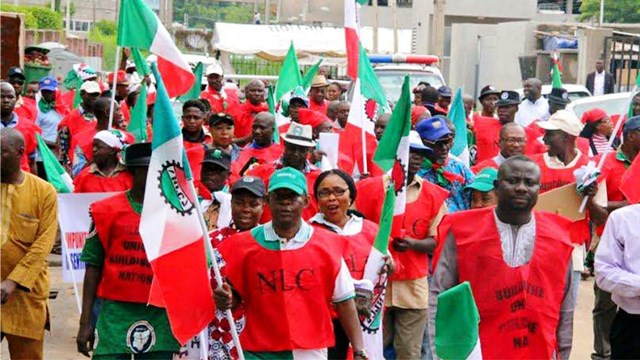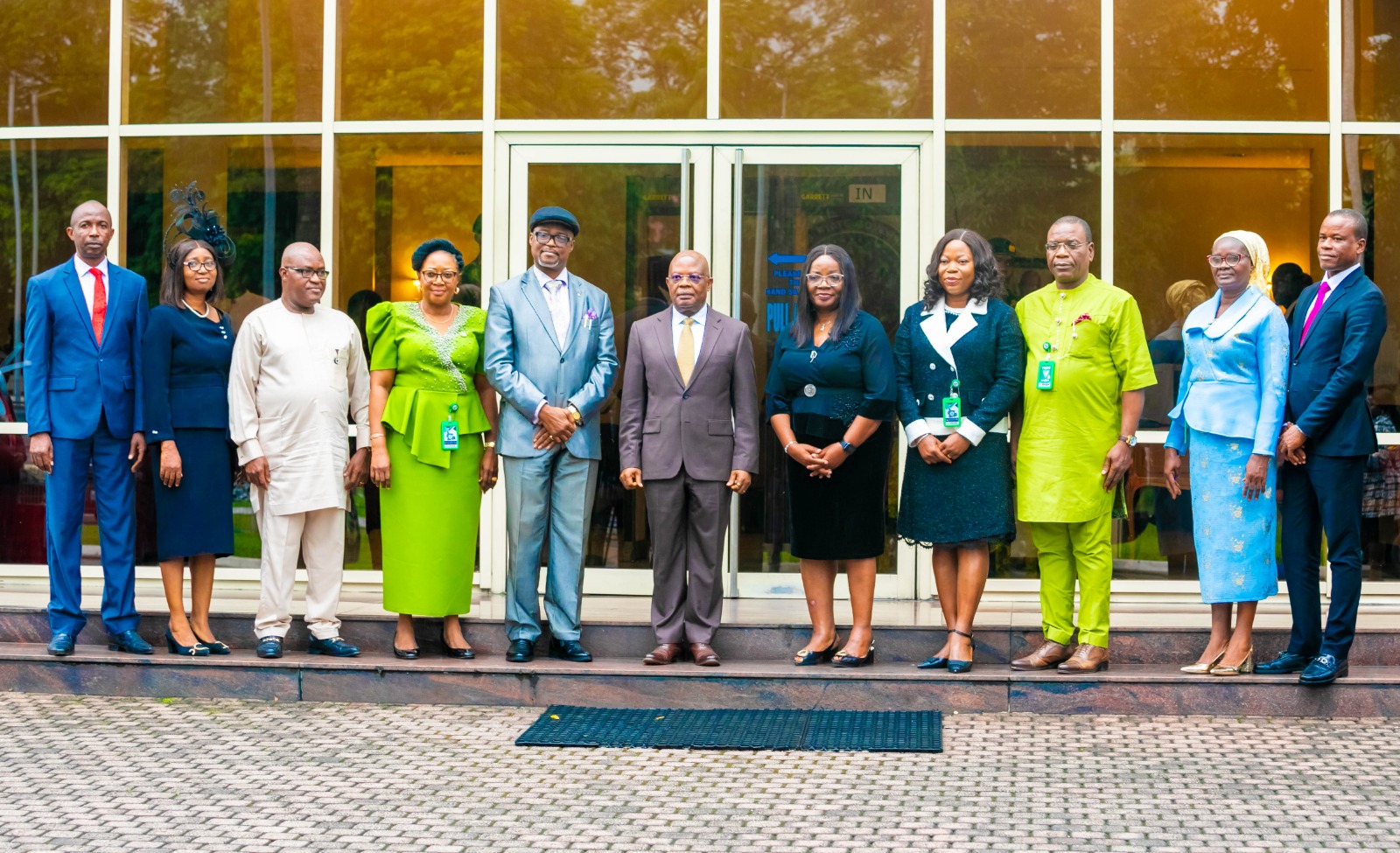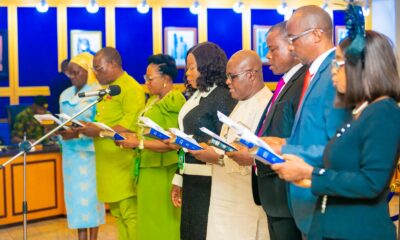Featured
Minimum Wage Saga: FG Transmits Bill To NASS, Jan 23 …As ASUU Suspends Strike

The Federal Government says the National Minimum Wage Bill will be transmitted to the National Assembly on or before January 23, 2019.
The Minister of Labour and Employment, Senator Chris Ngige, said this while speaking with newsmen after a closed-door meeting with the leadership of organised labour yesterday in Abuja.
Ngige said that the Federal Government and the organised labour had signed a Memorandum of Understanding that on or before January 23, the National Minimum Wage Bill would be sent to the National Assembly.
“On the part of government, we are going to try to religiously implement all the processes that will enable us to transmit this bill within the stipulated time.
“We have a target time of January 23, and we hope that all things being equal, the executive will be able to do so.
“We will take on the statutory meetings of the Federal Executive Council, National Economic Council and the National Council of States to enable us to transmit the bill on the new national minimum wage.”
The minister, while commending labour for its cooperation and understanding, called for the withdrawal of the threat of an industrial action, saying that it was no longer necessary.
Also speaking with newsmen, Nigeria Labour Congress (NLC) President, Ayuba Wabba, said they had agreed that on or before January23, the bill would be transmitted to the National Assembly.
“We have agreed that the agreement reached should be documented and it should be signed by government representatives and organised labour; we thought that is a more firm commitment.
“We believe with this, we can actually start following up the process; we have asked them to keep faith with the timeline, so that it will be concluded, as the minimum wage issue has been on the table for the past two years.
“We also thought that after having submitted the report and also drafted a draft, the bill, by now, we expected that it should have been submitted.”
He also noted that the NASS would resume from their recess on January 16 and that since the legislators were desirous of ensuring that Nigerian workers earned decent wage, they would also do the needful.
“We will shift our lobby to the NASS because once the bill is enacted, the money will be in the pockets of the workers.
“The issue of industrial relations is always addressed at the round-table. We have been diligent in the whole process and workers have been patient.
“So, we are committed to the process and hope that the timeline will be respected. “We will put this across to our organs and give them all the details contained in the Memorandum of Understanding,’’ Wabba said.
Meanwhile, organised labour, yesterday in Abuja, urged President Muhammadu Buhari to immediately transmit the new National Minimum Wage Bill to the National Assembly.
President of Nigeria Labour Congress(NLC), Mr Ayuba Wabba, made the call at a protest rally. The National Executive Council of NLC had threatened to embark on a nationwide protest on Jan. 8 if the Federal Government fails to send the Tripartite Committee Report on N30,000 Minimum Wage bill to NASS.
The organised labour gave the ultimatum following President Muhammadu Buhari’s statement that a “high powered technical committee,” would be set up to device ways to ensure that its implementation did not lead to an increase in the level of borrowing.
Wabba said the protest rally served as a warning to the Federal Government before a nationwide strike if government continued to delay the transmission of the Minimum Wage Bill to the National Assembly.
According to Wabba, “workers’ welfare and wellbeing must be paramount, that was why we insist this rally must take place across the length and breadth of the country.
“Today, in every government house in Nigeria, the protest is taking place, and here we are in the office of the Minister of the FCT.
“We want to say that workers are very central to economic development and very central to the prosperity of any country and therefore we cannot be described as the tiny minority.
“Workers are very productive, we built the Nigerian economy, we fought for democracy, rule of law and good governance and there is no way we can be described as tiny minority, as we service the entire country.
“So, workers must be able to take care of their families, send their children to school. But today, workers are not able to feed three times a day or send their children to school.
“Because minimum wage of N18,000 is no longer realistic to take care of workers’ needs,’’ he said.
Wabba said that N30,000 was agreed on, adding that Nigerian economy is capable of sustaining the new minimum wage.
“We are here to submit our letter of protest and demand like our states councils are doing in their various states right now, to the FCTA Minister for onward transmission to Mr President.
“We want to call on Mr President for the onward transmission of the bill to the National Assembly as the protest rally served as a warning before a nationwide strike,’’ he said.
Mr Amechi Asugwah, the President, Construction and Wood Workers Union of Nigeria, who spoke, decried government’s posture towards the implementation of the national minimum wage.
He said that workers decided to take the action, because they “ have waited more than enough, and we are running out of patience.
“As a matter of fact, we do not need to serve another notice before embarking on a nationwide strike.
“We have decided to take strong action to drive the issue of the minimum wage as it concerns workers in the country, “he added. Mr Lazarus Gaza, Head of Human Resources in the FCTA, who received the protest letter from the NLC president, assured that the letter would be delivered accordingly.
Senator Shehu Sani, who represents Kaduna Central, said he was there to lend his support for the struggle for the new national minimum wage.
Meanwhile, the Minister of Labour and Employment, Chris Ngige, and representatives of Academic Staff Union of Universities (ASUU) have risen from a meeting with both parties agreeding to put an end to the ongoing ASUU strike in order to give the Federal Government time to sort out the subsidy issue with Nigerian Labour Congress (NLC).
The Federal Government has also agreed to meet some of ASUU’s demands.
In the interim, ASUU has suspended its strike but vowed to embark on a six-month strike if the agreements reached are not implemented.
“We urge all students and lecturers to return to their respective schools from (Wednesday) 9th of January,” the union said in a statement.
The Federal Government had, last Monday reached an agreement with members of the Academic Staff Union of Universities (ASUU).
The Minister of Labour and Employment, Chris Ngige, made this known after the meeting with the union in Abuja.
Ngige said the majority of their demands have been met, including the release of N15.4 billion for payment of salary shortfalls.
He said, “On the issue of salaries in tertiary institutions, especially in universities, the Ministry of Finance and the Office of the Accountant- General provided evidence that as at December 31, 2018 the Federal Government had remitted N15.4 billon.
“Also on the issue of Earned Allowances in the universities system, they also showed us evidence that Mr President has approved the N20 billion to be used to offset the outstanding arrears of the 2009 and 2012, audit verified earnings, in the university system.
“This money is being worked on, and will be released to ASUU as soon as the process is completed.
“ASUU has fulfilled its own side of the bargain in terms of NUPECO, which is the Pension Fund Administration company that ASUU has floated to take care of pension for people in the university system.
“The Pension regulator, the PENCOM, has asked certain positions to be fulfilled and they gave ASUU a temporary licence, which has expired.
“ASUU has submitted all the documents and fulfilled all conditions needed to get their licence,” he said.
Ngige noted that the meeting had resolved to mandate the Ministry of Education to get in touch with PENCOM to make sure that the permanent license was issued to ASUU as soon as possible.
Featured
Rivers A Strategic Hub for Nigeria’s Blue Economy -Ibas …Calls For Innovation-Driven Solutions

The Administrator of Rivers State, Vice Admiral (Rtd.) Ibok-Ete Ibas, has emphasized the need for innovation-driven strategies, strategic partnerships, and firm policy implementation to fully harness the vast potential of the blue economy.
Speaking during a courtesy visit by participants of Study Group 7 of the Executive Course 47 from the National Institute for Policy and Strategic Studies (NIPSS) at Government House, Port Harcourt, on Monday, Ibas highlighted the importance of diversifying Nigeria’s economy beyond oil by leveraging maritime resources to create jobs, enhance food security, strengthen climate resilience, and generate sustainable revenue.
The Administrator, according to a statement by his Senior Special Adviser on Media, Hector Igbikiowubo, noted that with coordinated efforts and innovative solutions, the blue economy could serve as a catalyst for inclusive growth, economic stability, and long-term environmental sustainability.
“It is estimated that a fully developed blue economy could generate over $296 million annually for Nigeria, spanning fisheries, shipping and logistics, marine tourism, offshore renewable energy, aquaculture, biotechnology, and coastal infrastructure,” he stated.
“We must transition from extractive practices to regenerative, inclusive, and innovation-driven solutions. This requires political cohesion, intergovernmental collaboration, robust infrastructure, and institutional capacity—all of which must be pursued with urgency and intentionality,” he added.
Ibas urged sub-national governments, particularly coastal states, to domesticate the national blue economy framework and develop tailored strategies that reflect their comparative advantages.
He stressed that such efforts must be guided by disciplined planning, regulation, and investment to maximize the sector’s potential.
Highlighting Rivers State’s pivotal role, the Administrator outlined its strategic advantages as follows:
•Nearly 30% of Nigeria’s total coastline (approximately 853km)
•Over 40% of Nigeria’s crude oil and gas output
•More than 33% of the country’s GDP and foreign exchange earnings
•416 of Nigeria’s 1,201 oil wells, many located in marine environments
•Two of Nigeria’s largest seaports, two oil refineries, and the Nigerian Liquefied Natural Gas (NLNG) terminal in Bonny Island—one of Africa’s most advanced gas facilities
Despite these opportunities, Ibas acknowledged challenges such as pollution, coastal erosion, illegal oil refining, unregulated fishing, inadequate infrastructure, and maritime insecurity.
He reaffirmed his administration’s commitment to institutional reforms, coastal zone management, and inter-agency collaboration to build a governance structure that supports a sustainable blue economy.
“Sustainability must be embedded in our development models from the outset, not as an afterthought. We are actively exploring partnerships in maritime education, aquaculture development, port modernization, and renewable ocean energy. We welcome knowledge-sharing engagements like this to refine our strategies and enhance implementation,” he said.
He urged the NIPSS delegation to ensure their findings translate into actionable recommendations that address the sector’s challenges.
Leader of the delegation, Vice Admiral A.A. Mustapha, explained that the visit aligns with their strategic institutional tour mandate on the 2025 theme: “Blue Economy and Sustainable Development in Nigeria: Issues, Challenges, and Opportunities.”
The group is engaging stakeholders to deepen understanding of policy efforts and institutional roles in advancing sustainable development through the blue economy.
Featured
INEC To Unveil New Party Registration Portal As Applications Hit 129

The Independent National Electoral Commission (INEC) has announced that it has now received a total of 129 applications from associations seeking registration as political parties.
The update was provided during the commission’s regular weekly meeting held in Abuja, yesterday.
According to a statement signed by the National Commissioner and Chairman of the Information and Voter Education Committee, Sam Olumekun, seven new applications were submitted within the past week, adding to the previous number.
“At its regular weekly meeting held today, Thursday 10th July 2025, the commission received a further update on additional requests from associations seeking registration as political parties.
“Since last week, seven more applications have been received, bringing the total number so far to 129. All the requests are being processed,” the commission stated.
The commission revealed the introduction of a new digital platform for political party registration. The platform is part of the Party Financial Reporting and Auditing System and aims to streamline the registration process.
Olumekun disclosed that final testing of the portal would be completed within the next week.
“INEC also plans to release comprehensive guidelines to help associations file their applications using the new system.
“Unlike the manual method used in previous registration, the Commission is introducing a political party registration portal, which is a module in our Party Financial Reporting and Auditing System.
“This will make the process faster and seamless. In the next week, the commission will conclude the final testing of the portal before deployment.
“Thereafter, the next step for associations that meet the requirements to proceed to the application stage will be announced. The commission will also issue guidelines to facilitate the filing of applications using the PFRAS,” the statement added.
In the meantime, the list of new associations that have submitted applications has been made available to the public on INEC’s website and other official platforms.
Featured
Tinubu Signs Four Tax Reform Bills Into Law …Says Nigeria Open For Business

President Bola Tinubu yesterday signed into law four tax reform bills aimed at transforming Nigeria’s fiscal and revenue framework.
The four bills include: the Nigeria Tax Bill, the Nigeria Tax Administration Bill, the Nigeria Revenue Service (Establishment) Bill, and the Joint Revenue Board (Establishment) Bill.
They were passed by the National Assembly after months of consultations with various interest groups and stakeholders.
The ceremony took place at the Presidential Villa, yesterday.
The ceremony was witnessed by the leadership of the National Assembly and some legislators, governors, ministers, and aides of the President.
The presidency had earlier stated that the laws would transform tax administration in the country, increase revenue generation, improve the business environment, and give a boost to domestic and foreign investments.
“When the new tax laws become operational, they are expected to significantly transform tax administration in the country, leading to increased revenue generation, improved business environment, and a boost in domestic and foreign investments,” Special Adviser to the President on Media, Bayo Onanuga said on Wednesday.
Before the signing of the four bills, President Tinubu had earlier yesterday, said the tax reform bills will reset Nigeria’s economic trajectory and simplify its complex fiscal landscape.
Announcing the development via his official X handle, yesterday, the President declared, “In a few hours, I will sign four landmark tax reform bills into law, ushering in a bold new era of economic governance in our country.”
Tinubu made a call to investors and citizens alike, saying, “Let the world know that Nigeria is open for business, and this time, everyone has a fair shot.”
He described the bills as not just technical adjustments but a direct intervention to ease burdens on struggling Nigerians.
“These reforms go beyond streamlining tax codes. They deliver the first major, pro-people tax cuts in a generation, targeted relief for low-income earners, small businesses, and families working hard to make ends meet,” Tinubu wrote.
According to the President, “They will unify our fragmented tax system, eliminate wasteful duplications, cut red tape, restore investor confidence, and entrench transparency and coordination at every level.”
He added that the long-standing burden of Nigeria’s tax structure had unfairly weighed down the vulnerable while enabling inefficiency.
The tax reforms, first introduced in October 2024, were part of Tinubu’s post-subsidy-removal recovery plan, aimed at expanding revenue without stifling productivity.
However, the bills faced turbulence at the National Assembly and amongst some state governors who rejected its passing in 2024.
At the NASS, the bills sparked heated debate, particularly around the revenue-sharing structure, which governors from the North opposed.
They warned that a shift toward derivation-based allocations, especially with VAT, could tilt fiscal balance in favour of southern states with stronger consumption bases.
After prolonged dialogue, the VAT rate remained at 7.5 per cent, and a new exemption was introduced to shield minimum wage earners from personal income tax.
By May 2025, the National Assembly passed the harmonised versions with broad support, driven in part by pressure from economic stakeholders and international observers who welcomed the clarity and efficiency the reforms promised.
In his tweet, Tinubu stressed that this is just the beginning of Nigeria’s tax evolution.
“We are laying the foundation for a tax regime that is fair, transparent, and fit for a modern, ambitious Nigeria.
“A tax regime that rewards enterprise, protects the vulnerable, and mobilises revenue without punishing productivity,” he stated.
He further acknowledged the contributions of the Presidential Fiscal Policy and Tax Reform Committee, the National Assembly, and Nigeria’s subnational governments.
The President added, “We are not just signing tax bills but rewriting the social contract.
“We are not there yet, but we are firmly on the road.”
-
Business1 day ago
NCDMB Promises Oil Industry Synergy With Safety Boots Firm
-

 News1 day ago
News1 day agoRivers Police Arrest Notorious Cultist, Recover Sophisticated Ammunition
-
Niger Delta1 day ago
Adopt African System Against Crime, Don Urges Security Agencies
-

 News24 hours ago
News24 hours agoIbas Inaugurates RSIEC, Service Commissions, Healthcare Board In Rivers …Charges Appointees To Embrace Principles Of Service
-
Rivers1 day ago
Monarch Cautions Youths Against Illicit Drug Consumption
-
Opinion1 day ago
Why Reduce Cut-Off Mark for C.O.E ?
-

 News1 day ago
News1 day agoNIMASA Shuts Two Lagos Terminals Over Security Breach
-
Politics1 day ago
Alleged Money Laundering: Fayose Has No Case To Answer, Court Tells EFCC

